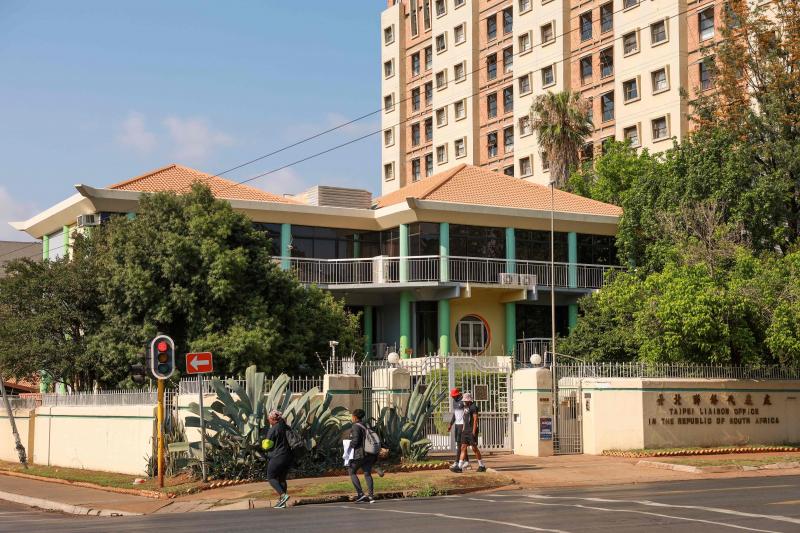The Taiwanese Association in Southern Africa (TASA) yesterday sent a letter to South Africa’s Presidential Office and parliament to urge the government to withdraw its demand for Taiwan to relocate its liaison office out of the capital.
On Friday last week, the South African government publicly stated that Taiwan’s representative office must relocate out of Pretoria, a move that the Ministry of Foreign Affairs said was due to pressure from China.
South Africa had reportedly first requested the office to leave Pretoria last year before officially asking the office in April to do so by the end of this month.

Photo: AP
Yesterday, TASA, along with the Africa Taiwanese Chambers of Commerce, published an open letter urging the government to reconsider its demand.
There are currently about 7,000 to 8000 Taiwanese citizens living in South Africa, including those who moved there decades ago, local-born people and businesspeople who are there temporarily, Pretoria City Councilor Lee Chung-wei (李崇維) said.
Lee sent the open letter on behalf of the organizations to the government, as well as local media, in hopes that the two countries could maintain long-standing friendly relations, as well as uphold the values of democracy and freedom, he said.
The letter highlighted the positive effects of bilateral trade and humanitarian aid and appealed to both countries’ recent history overcoming historical difficulties.
“Given South Africa’s experience with apartheid, it should be empathetic to the values of freedom of speech, belief, movement, opinion and expression,” the TASA letter said.
The letter also highlights South Africa’s US$700 million trade surplus with Taiwan, which provides its growing automotive manufacturing sector with key components, as well as the liaison office’s work in coordinating relief efforts for the “most vulnerable” South Africans.
These relief efforts include donating 500 tons of rice this year alone, as well as hundreds of wheelchairs and millions of US dollars for other relief aid such as blankets, hygiene products and groceries, the letter said.
The letter ends by calling the relocation request “extreme prejudice” against the Taiwanese community.
In related news, the US Department of State said that it encourages all countries to deepen their engagement with Taiwan.
Although South Africa’s government has denied that it is facing pressure from China, a number of US lawmakers have publicly linked the move to Beijing, including US senators Marsha Blackburn and Tom Cotton, as well as US representatives Carlos Gimenez, Michelle Steel and Foreign Affairs Committee Chairman Michael McCaul.
In a statement, a US Department of State spokesperson said that while the US does not have its own commentary on the matter, Taiwan’s international partnerships bring substantial and sustainable benefits to other nations.
The deadline for the office to leave Pretoria is on Thursday next week, although it remains unclear whether South Africa will withdraw the demand or what countermeasures Taiwan's foreign ministry will implement.

Taiwan has received more than US$70 million in royalties as of the end of last year from developing the F-16V jet as countries worldwide purchase or upgrade to this popular model, government and military officials said on Saturday. Taiwan funded the development of the F-16V jet and ended up the sole investor as other countries withdrew from the program. Now the F-16V is increasingly popular and countries must pay Taiwan a percentage in royalties when they purchase new F-16V aircraft or upgrade older F-16 models. The next five years are expected to be the peak for these royalties, with Taiwan potentially earning

STAY IN YOUR LANE: As the US and Israel attack Iran, the ministry has warned China not to overstep by including Taiwanese citizens in its evacuation orders The Ministry of Foreign Affairs (MOFA) yesterday rebuked a statement by China’s embassy in Israel that it would evacuate Taiwanese holders of Chinese travel documents from Israel amid the latter’s escalating conflict with Iran. Tensions have risen across the Middle East in the wake of US and Israeli airstrikes on Iran beginning Saturday. China subsequently issued an evacuation notice for its citizens. In a news release, the Chinese embassy in Israel said holders of “Taiwan compatriot permits (台胞證)” issued to Taiwanese nationals by Chinese authorities for travel to China — could register for evacuation to Egypt. In Taipei, the ministry yesterday said Taiwan

Taiwan is awaiting official notification from the US regarding the status of the Agreement on Reciprocal Trade (ART) after the US Supreme Court ruled US President Donald Trump's global tariffs unconstitutional. Speaking to reporters before a legislative hearing today, Premier Cho Jung-tai (卓榮泰) said that Taiwan's negotiation team remains focused on ensuring that the bilateral trade deal remains intact despite the legal challenge to Trump's tariff policy. "The US has pledged to notify its trade partners once the subsequent administrative and legal processes are finalized, and that certainly includes Taiwan," Cho said when asked about opposition parties’ doubts that the ART was

If China chose to invade Taiwan tomorrow, it would only have to sever three undersea fiber-optic cable clusters to cause a data blackout, Jason Hsu (許毓仁), a senior fellow at the Hudson Institute and former Chinese Nationalist Party (KMT) legislator, told a US security panel yesterday. In a Taiwan contingency, cable disruption would be one of the earliest preinvasion actions and the signal that escalation had begun, he said, adding that Taiwan’s current cable repair capabilities are insufficient. The US-China Economic and Security Review Commission (USCC) yesterday held a hearing on US-China Competition Under the Sea, with Hsu speaking on